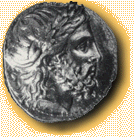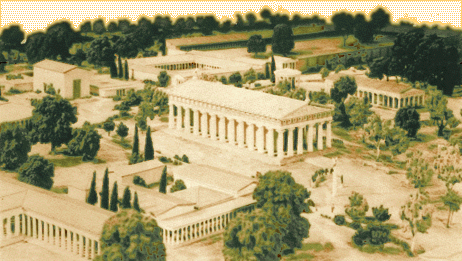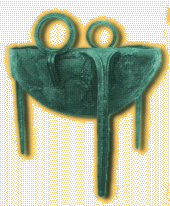How did the Olympic Games get started?
The ancient Olympic Games were primarily a part of a religious festival in honor of Zeus, [Quiz Clue!] the father of the Greek gods and goddesses. The festival and the games were held in Olympia, a rural sanctuary site in the western Peloponnesos. [see map] Gadzooks! It's Zeus!

Obverse ("heads") of silver tetradrachm, minted by Philip II of
Macedonia ca. 350 BC to commemorate his victory in the horse race at Olympia.

Model of the Sanctuary of Zeus at Olympia, where the first games were held as part of religious festivals honoring Zeus. The Temple of Zeus is near the center. [see plan]
The Greeks that came to the Sanctuary of Zeus at Olympia shared the same religious beliefs and spoke the same language. The athletes were all male citizens of the city-states from every corner of the Greek world, coming from as far away as Iberia (Spain) in the west and the Black Sea (Turkey) in the east.
The sanctuary was named in antiquity after
Mt. Olympos, the highest mountain in mainland Greece. In Greek mythology,
Mt. Olympos was the home of the greatest of the Greek gods and goddesses.
From 776 BC, the Games were held in Olympia every four years for almost 12
centuries.
Additional athletic events were gradually added until, by the 5th century BC, the religious festival consisted of a five-day program. The athletic events included three foot races, stadion diaulos and dolichos as well as the pentathlon (5 contests: discus, javelin, long jump, wrestling, and foot race) pugme (boxing) pale (wrestling) pankration and the hoplitodromos.
Additional events, both equestrian and for humans, were added throughout the course of the history of the Olympic Games.
Equestrian events, held in the hippodromos,
were an important part of the athletic program of the ancient Olympic Games
and by the 5th century BC included the tethrippon and the keles.

The ancient Olympic Games began in the year 776 BC, when Koroibos, a cook from the nearby city of Elis, won the stadion race, a foot race 600 feet long.
According to some literary traditions, this was the only athletic event of the games for the first 13 Olympic festivals or until 724 BC.
Contrary evidence, both literary and archaeological, suggests that the games may have existed at Olympia much earlier than this date, perhaps as early as the 10th or 9th century BC.

A series of bronze tripods have been found
at Olympia, some of which may date to the 9th century BC, and it has been
suggested that these tripods may in fact be prizes for some of the early events
at Olympia.
The marathon was NOT an event of the ancient Olympic games. The marathon is
a modern event that was first introduced in the Modern Olympic Games of 1896
in Athens, a race from Marathon northeast of Athens to the Olympic Stadium,
a distance of 40 kilometers.
The race commemorates the run of Pheidippides, an ancient "day-runner" who carried the news of the Persian landing at Marathon of 490 B.C. to Sparta (a distance of 149 miles) in order to enlist help for the battle. According to the fifth century B.C.ancient Greek historian Herodotus, Pheidippides delivered the news to the Spartans the next day.
The distance of the modern marathon was standardized
as 26 miles 385 yards or 42.195 km. in 1908 when the Olympic Games were held
in London. The distance was the exact measurement between Windsor Castle,
the start of the race, and the finish line inside White City Stadium.
Nudity at the Games? There are two stories
relating to the question of nudity at the ancient Olympic Games. One story
states that it was a runner from Megara, Orsippos or Orrhippos who, in 720
B.C. was the first to run naked in the 'stadion' race when he lost his shorts
in the race. Another tradition is that it was the Spartans who introduced
nudity to the Olympic Games in the 8th century B.C. as it was a Spartan tradition.
It is not clear if the very first recorded victor at Olympia, Koroibos, who
won the 'stadion' race in 776 B.C. wore shorts or not. It seems fairly clear
that by the late 8th century nudity was common for the male contestants.
